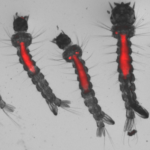Vector Biol. J. 2018 Jan;2(2)
Abstract
Background: The bacterial microbiota which colonize the mosquito midgut play an important role in vector-parasite interactions and consequently can modulate the level of malaria transmission. Their characterization may contribute to new control strategies of malaria transmission. However, these bacteria may also be eliminated in areas of high antibiotics usage. In this study, we identified paratransgenesis bacteria candidate in the gut of adults female Anopheles in Burkina Faso.
Methods: The gut of 73 semi-field mosquitoes and 28 laboratory- reared mosquitoes from two villages in Burkina Faso were analyzed by conventional in vitro culture techniques to isolate and identify bacteria of the microbiota. The gene 16S sequencing was used to confirm the presence of bacteria of paratransgenesis interest. Due to the effect of antibiotics on bacteria, we evaluated in vitro their susceptibility to antibiotics generally used for infectious diseases treatment.
Results: In total, eleven genera of bacteria were identified: Pantoea, Sphingomonas, Escherichia, Micrococcus, Staphylococcus, Klebsiella, Serratia, Acinetobacter, Pseudomonas, Citrobacter, Asaia. Among these bacteria isolated, Asaia. sp and Pantoea. sp have already been reported as candidates for paratransgenesis. In addition, we observed pathogenic bacteria such as Escherichia coli, Klebsiella pneumonia and Pseudomonas luteola. Investigation of the correlation between the bacterial microbiota and malaria infection status showed that mosquitoes engorged with blood containing Plasmodium falciparum contained a higher bacterial load than non-blood fed mosquitoes. The antibiotic susceptibility test showed that Asaia, Pantoea and Serratia, previously proposed as paratransgenesis candidates, were susceptible to different antibiotics tested in contrast to Escherichia coli, which were resistant.
Discussion: Midgut analysis shows that the composition of the bacterial microbiota in wild field mosquitoes exhibits a large variability in contrast to laboratory-reared mosquitoes. The presence of genera already proposed as paratransgenesis candidates in
previous studies among bacteria isolated in our study, suggested the possible implementation of this control strategy in Burkina Faso. Nevertheless, our data indicates that an in vivo verification of the stability of these bacteria is needed, as this strategy may be impaired by mass drug administration programs and antibiotic misuse.


